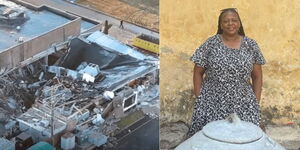The government is planning to effect the Sustainable Waste Management Act which will require every household in Kenya to have at least three dustbins to separate waste for recycling.
Sustainable Waste Management Act envisions a situation where all households in Kenya separate their garbage into dry waste, organic waste and hazardous waste.
According to the legislation, Kenyans who go against the law, will be deemed to have committed an offence and shall upon conviction, be liable to a fine not exceeding Ksh20,000 or imprisonment for a term not exceeding six months or both.
The legislation is also seeking to gatekeep how Kenyans dispose waste. The law wants to ensure that Kenyans only work with licensed waste service providers and only dump trash at designated collection points.
Similarly, the law also seeks to grant county governments the sole mandate of developing, managing and maintaining designated disposal sites and landfills.
Counties will also be handed the mandate of maintaining a register of all waste service providers operating within their jurisdiction.
According to experts, the law has been necessitated by the country's plans to transition to a circular economy model.
This means ensuring that the country constantly finds creative ways to handle waste by repurposing it into something useful.
While many manufacturing companies are already implementing the Act, it is a challenge to access quality and quantity waste because the country historically, does not have a culture that encourages sustainable waste disposal.
“It is now going to be mandatory for every household to segregate waste at a bare minimum of dry waste, organic waste and hazardous waste. This also extends to waste service providers,” the Act stipulates.
Dry waste will comprise mainly household waste like paper, glass, plastic, cardboard, styrofoam, rubber, metal, and food packaging material. The reason dry waste needs a special bin is that it cannot be recycled if soiled or contaminated.
On the other hand, wet waste is mainly biodegradable waste that can be composted. This can include vegetable/fruit peels as well as food leftovers and yard waste.
Hazardous waste includes household wastes that are toxic, corrosive, ignitable, or reactive.
This can include and not limited to; household cleaners, drain openers, batteries, medicine and obsolete electronic equipment.












